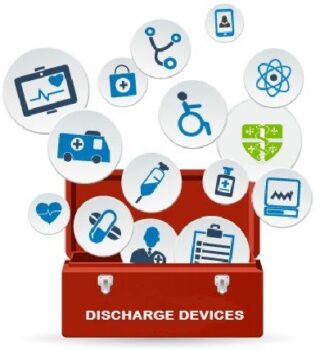Q Exchange
Discharge Devices
- Proposal
- 2019

Meet the team
Also:
- Carmel Synan-Jones, L&D
- Catherine Thorne, L&D
- Marilyn George, Luton CCG
- Sally Shaw, CCS
- Sally Shaw
What is the challenge your project is going to address and how does it connect to your chosen theme?
NHSi produced Developing People-Improving Care a national framework to equip and encourage people in NHS-funded roles to deliver continuous improvement in local health and care systems and gain pride and joy in their work. To this end we would like to use a QI collaborative approach to design a system wide toolkit for safe, effective and efficient discharge of patients from a hospital setting. We know from patient feedback, incident analysis and complaints we do not always get this right. Staff are keen to work on projects that have a strong patient safety objective. Appreciating discharge of some of our most vulnerable patients is one of the most complex aspects of a patients journey and often fraught with opportunities for lapses in care from a human factors perspective. Many of the issues reported can be traced back to poor communication between staff within the departments here at the trust as well as to external organisations.
What does your project aim to achieve?
To develop a co-designed standardised discharge toolkit that can be utilised across the health and social care setting.
Objectives
· Source a facilitator with QI skills
- Review best practice guidelines and undertake a gap analysis against our current process
· Review the complaints, incidents and feedback and theme them
· Decide on baseline measures
· Review the patient process or journeys for the most complex patients with relevant stakeholders
· Standardise the discharge paperwork that goes to all nursing organisations externally
· Review our internal discharge checklist
· Review and update the internal standard operating procedures for discharge and any associated policies
· Consider the communication and training that may need to follow to update staff on any changes or address the recurrent errors.
How will the project be delivered?
Using a collaborative methodology with partner organisations we plan to explore the pathways for patients through the hospital to establish the requirement from the variety of stakeholders.
The groups be given an opportunity to learn and use NHS tools for service improvement, for example driver diagrams, identify outcome and process measures, undertake stakeholder analysis, create a communication plan, process maps, and the model for improvement PDSA cycle.
The group will need to understand each stakeholders perspective on their interventions or touch points on each patients journey and vitally the communication tool they use to collect and forward patient information for safe transition through the system.
Front line staff from all the organisations will be involved and lead discussions in the focus groups in order to clearly establish what works best in practice. Facilitation of the focus groups will be from someone with quality service improvement skills.
What and how is your project going to share learning throughout?
In line with the PDSA cycle of improvement learning will begin in a small controlled way and be spread across the wards and departments, with local adaptions where necessary. The sustainability of the project will be monitored and evaluated throughout and continue to become business as usual.
Best practice and progress will be shared at divisional and board meetings as part of the communication strategy. We have the use of quality improvement information notice boards around the trust and a quarterly newsletter. We hold twice yearly staff engagement events where we celebrate success with a heavy emphasis on quality improvement.
How you can contribute
- Any help in sourcing a facilitator that can energise and motivate a group, the bonus would be someone with NHS experience?
- Has anyone undertaken something similar and what worked well?
Plan timeline
| 18 Nov 2019 | Set up project group source facilitator and data support |
|---|---|
| 2 Dec 2019 | Set up workshop dates source venue, begin comms |
| 6 Jan 2020 | Data support officer and admin to commence data collection |
| 20 Jan 2020 | pre meet with facilitator, outline plans |
| 3 Feb 2020 | first workshop this week |
| 16 Feb 2020 | Evaluation and support to local teams |
| 2 Mar 2020 | Second workshop this week |
| 16 Mar 2020 | Evaluation and support meetings |
| 6 Apr 2020 | Third Workshop this week |
| 20 Apr 2020 | Evaluation and support meetings |
| 4 May 2020 | Last full workshop |
| 18 May 2020 | Evaluation of the project outcomes and products |
Comments
Debbie Brazil 27 Jul 2019
Hi Emma
thanks for that suggestions.
I am now on leave but wanted to let you know we’ve seen this! I will catch up with the team when back around 12 August and we will reply properly then.
Debbie
Emma Adams 25 Jul 2019
Hi Deborah. I really like the idea and wondered if Hexitime might be able to help you with a facilitator?
It would also be helpful to know if your project team includes staff from across the system - for example, home care staff will have a lot of experience of supporting people post-discharge and could be a good resource for the development of the toolkit.
Comments are now closed for this post.